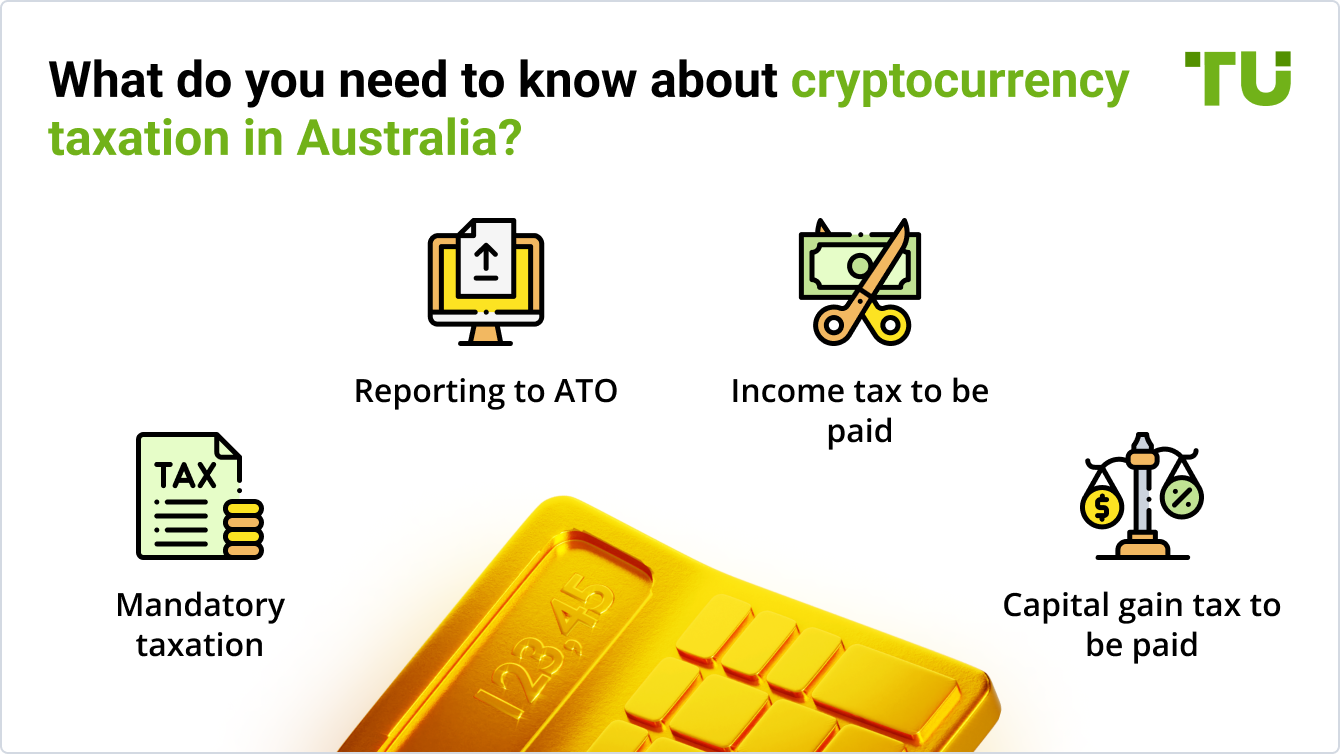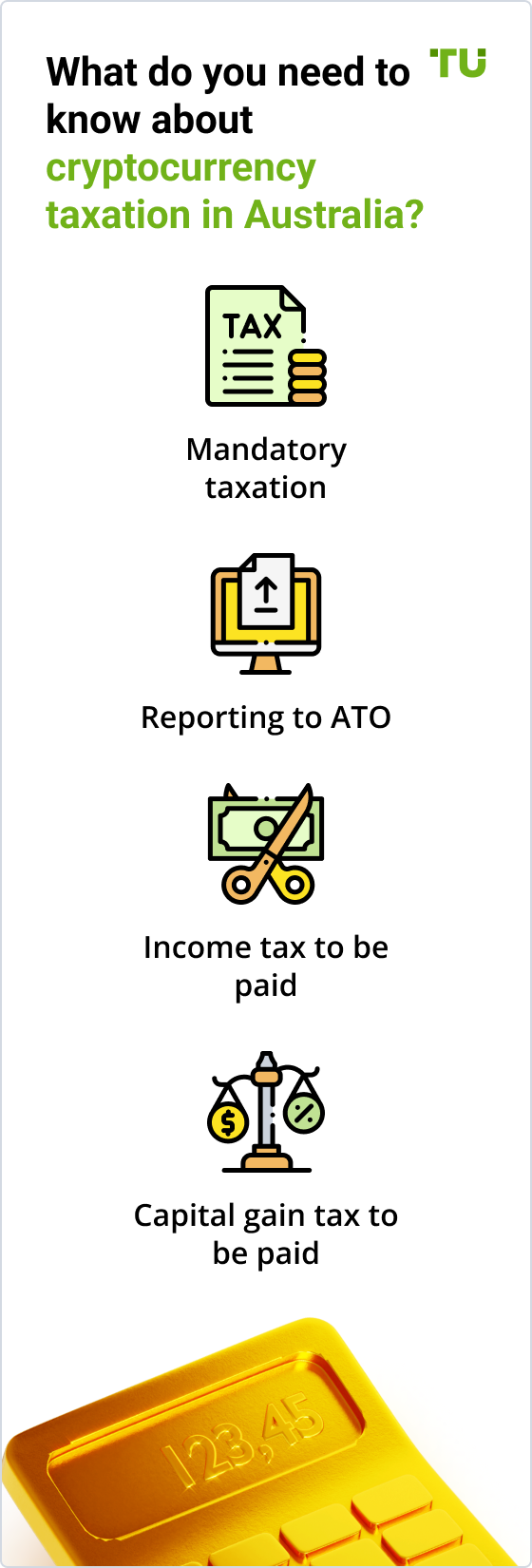Do I Pay Crypto Tax in Australia?

Bybit - Best crypto exchange for 2025 (Australia)
There’s an age-old saying, “Nothing in life is certain but death and taxes”. And when it comes to cryptocurrency trading and investments in Australia, taxes are a certainty. This is simply because the Australian government has access to crypto trading and investment data which means it’ll know if you generate returns or income from your crypto trading activities.
As a result, it’s vital that you understand the tax implications of these activities so that you’ll know what taxes you’ll be liable for. In this post, we’ll look at these tax implications and the circumstances where you’ll be liable for taxes in more detail.


Cryptocurrency Taxation in Australia - Key Takeaways
In Australia, the Australian Taxation Office (ATO) provides that you’ll be liable for taxes at any time when you dispose of cryptocurrencies. Although taxation is certain, the type of tax you’ll need to pay differs based on your specific circumstances.
As such, under certain circumstances, you’ll need to pay capital gains tax while in others, you’ll be liable for income tax. We’ll now look at these different sets of circumstances a bit closer.
Do I Pay Taxes on Cryptocurrencies in Australia?
The simple answer is yes, you’ll need to pay taxes on cryptocurrencies in Australia. As mentioned above, depending on your specific circumstances, you’ll either pay income tax or capital gains tax. It’s, therefore, crucial that, when you trade with or invest in cryptocurrencies, you are aware of the tax implications.
Does ATO Receive My Crypto Operations Data?
Before looking at the tax implications when trading with or investing in cryptocurrencies, it’s important to first understand that the Australian Taxation Office (ATO) has crypto transaction data in its possession going as far back as 2014. It obtains this data using several strategies.
For one, all cryptocurrency exchanges operating in Australia must report the details of Australian crypto traders and investors to the ATO. This means the ATO has the personal information these traders and investors used when opening their accounts as well as the transaction data of their purchases and sales.
Moreover, in 2020, the ATO commenced a letter notification system that aims to notify crypto traders and investors about their tax obligations resulting from their trading activities. In 2020, the ATO sent about 100,000 letters to notify traders of their possible tax obligations and request them to review their lodged returns and it planned to send another 100,000 notifications during 2023.
How to get free Bitcoins?How Does Australia Tax Traders and Investors?
Another important aspect we must consider is the distinction between traders and investors. This is simply because the ATO has different rules and taxes investors and traders differently.
According to the ATO, an investor is someone that invests in cryptocurrencies in order to generate long-term returns. So, similar to stocks, bonds, and other securities, as an investor, you’ll buy a specific cryptocurrency, hold it, and then sell it for a profit later. In these cases, you’ll be liable to pay capital gains tax on the profits that you generate.
Conversely, the ATO views those persons who operate a business and generate an income from cryptocurrencies as traders. This, for instance, includes crypto trading businesses, crypto mining businesses, and crypto exchange businesses.
It can also include other businesses that get paid with cryptocurrencies and those traders that make a living with trading by frequently buying and selling to capitalize on price movements. In all these cases, these traders will be liable for income tax on their earnings.
Income Tax Vs Capital Gain Tax
Considering the above, the question is: What’s the difference between income tax and capital gains tax? In its simplest terms, the difference between income tax and capital gains tax comes down to the way the taxed money is earned. To illustrate this difference better, let’s look at a simple everyday example.
Let’s assume you purchase a property for AUD 200,000 and you sell it in five years for AUD 550,000. In this way, you would’ve made a profit of AUD 150,000 excluding any other ownership and purchasing costs.
Now, let’s assume those costs amount to a further AUD 150,000. This means your capital gain as a result of the sale of the property would be AUD 550,000 less the purchase price of AUD 150,000 and the ownership costs of AUD 150,000. You’ll then be liable for capital gains tax on the amount of AUD 250,000.
In contrast to capital gains tax, you’re liable for income tax on the money you earn. This could take the form of tax on your salary or your business’s income. For instance, let’s say that you’re a property developer and you buy and sell properties during the course of your business. In this case, the profit you make when you do this will be classified as income and not as capital gains.
Let’s now look at how capital gains and income tax work when it comes to cryptocurrencies.
Crypto Capital Gain Tax Explained
Similar to our real estate example above, the ATO views cryptocurrency as an asset and you’ll be liable for capital gains tax when you dispose of your cryptocurrencies.
This disposal can take several forms including:
-
When you trade or sell cryptocurrency.
-
When you gift cryptocurrency to someone else.
-
When you exchange one cryptocurrency for another cryptocurrency.
-
When you convert a cryptocurrency to a fiat currency.
When you dispose of a cryptocurrency by, for instance, selling or exchanging it, you’ll need to calculate your capital gains tax. To do this, you’ll need to determine both the purchase and sales value of the cryptocurrency you’ve disposed of in Australian dollars.
A capital gain is then the difference between the cost base and your capital proceeds. Your cost base is the purchase price of the cryptocurrency including certain associated costs you’ve incurred to purchase, hold, and sell the cryptocurrency. The capital proceeds is the amount you received when you sold or exchanged the cryptocurrency.
Let’s look at an example to illustrate this better. Let’s say, for example, you buy Bitcoin to the value of AUD 1,000 and you sell it for AUD 2,000 later. During the purchase, sale, and when holding the Bitcoin, you’ve also incurred commissions and other costs in the amount of AUD 150. Your capital proceeds will then be AUD 850.
To calculate how much capital gains tax you’ll pay on the capital gains you’ve earned, you first need to look at what your marginal tax rate is as capital gains are taxed at the same rate as income tax. In other words, you need to look at the tax rate you pay on your total income during the tax year.
Currently, the tax rates are:
| Income | Tax Rate |
|---|---|
$0 to $18,200 |
0% |
$18,201 to $45,000 |
0 plus 19% of excess over $18,200 |
$45,001 to $120,000 |
$5,092 plus 32.5% of excess over $45,000 |
$120,001 to $180,000 |
$29,467 plus 37% of excess over $120,000 |
Over $180,001 |
$51,667 plus 45% of excess over $180,000 |
When you thus earn an income of $40,000 and you’ve earned capital gains of $10,000, you’ll pay tax on a total amount of $50,000. You’ll thus pay tax in the amount of $6717.
Now, what happens when you sell a cryptocurrency and your cost base is more than the capital proceeds? In other words, what happens when you sell your cryptocurrency for a loss? In this case, you’ll be able to deduct the loss from any other capital gains you’ve earned and you’ll also be able to carry the loss over to future years.
9 Best Crypto Trading Bots ReviewWhat is a Non-Taxable Maximum?
A non-taxable maximum or tax-free threshold is simply the maximum amount you can earn before you’ll need to pay tax. So, considering the table above, the non-taxable maximum is the amount of $18,200. If you earn any amount below that, you won’t have any tax liability.
Can I take advantage of tax breaks?
Apart from the non-taxable maximum or tax-free threshold, there are several other tax breaks you can take advantage of when it comes to cryptocurrencies. These include:
Personal use assets and cryptocurrency
When you dispose of a cryptocurrency that is a personal use asset, you may disregard it from your tax calculations. According to the ATO, cryptocurrency is a personal use asset if you keep and use it mainly to buy items for personal use or consumption. The problem is that it could be challenging to determine whether cryptocurrency is a personal use asset. Generally, though, when you buy cryptocurrencies for short periods of time to use it or buy personal items, it’s more than likely a personal use asset. Conversely, if you buy cryptocurrencies and hold on to them for longer while only spending small amounts, it’s more than likely an investment and will not qualify for this exemption.
Capital gains tax discount
Apart from the exclusion relating to personal use assets, you can also qualify for a 50% discount on capital gains tax. Here, the main requirement for an asset to qualify for the discount is that you should’ve owned it for at least 12 months. Another requirement is that you should be an Australian resident for tax purposes.
Crypto Income Tax Explained
As mentioned earlier, apart from capital gains tax, you might be liable to pay income tax on your cryptocurrency earnings in certain circumstances. At their core, these situations will be when you earn an income from trading with or dealing with cryptocurrencies.
This includes a variety of circumstances that could result in you earning an income from cryptocurrencies, including when:
-
You own a business, and you receive payments in cryptocurrencies.
-
Your salary is paid in cryptocurrencies.
-
You earn cryptocurrency rewards through staking.
-
You receive airdrops.
-
You earn interest on cryptocurrencies you lend out.
-
You earn dividends on cryptocurrencies you’ve invested.
Keep in mind, though, these are just some examples of situations where you’ll be regarded as earning an income from cryptocurrencies and there are many others. The key takeaway is that, when you’re actively earning an income or part of your income through dealing or trading with cryptocurrencies, you’ll be liable for income tax.
When you are, you’ll need to pay income tax based on the rates as set out in the table mentioned above. For example, if your only income during the tax year is $25,000 you’ve earned from cryptocurrencies, you’ll pay tax calculated as 19% on the excess over $18,200 or, in other words, $6,800. This means you’ll pay taxes in the amount of $1,292.
Best Crypto Telegram Groups For Signals and EducationYour Crypto Trading Model and Taxes
From the above, it’s clear that the strategy you employ when trading with cryptocurrency will have a significant impact on the taxes you’ll be liable for. If you invest in cryptocurrencies or, in other words, buy and hold crypto to generate returns, you’ll qualify as an investor which, in turn, means that you’ll be liable for capital gains tax.
Conversely, if you use a strategy where you buy and sell cryptocurrencies in the short term in order to take advantage of the fluctuations in the price, you’ll likely qualify as a trader which, in turn, means you’ll be liable for income tax. Also, if you run a business and you earn cryptocurrencies, you’ll be liable for income tax.
It’s important to keep in mind that the waters between these two strategies can get muddied in some cases and it can get challenging to determine what tax you’ll be liable for. It’s therefore vital that you understand how tax on crypto works in Australia and what the tax implications are for your specific strategy.
Lost or Stolen Cryptocurrency
Considering that you’ll be liable for either capital gains tax or income tax on your crypto earnings depending on your specific circumstances, the question is: What effect does it have on your tax if your crypto assets are stolen or lost?
Generally, you’ll be able to claim a capital loss if your cryptocurrency is lost or stolen. It’s important, however, to make a clear distinction between the situations where your cryptocurrency is lost, you’ve lost evidence of the ownership of your crypto assets, or you’ve lost access to your stored cryptocurrencies.
Here, you’ll have to consider whether your cryptocurrency is actually lost or whether you’ll be able to replace it. If you’ve lost it and it can’t be replaced, you’ll be able to claim a capital loss. Remember, though, you’ll have to present concrete evidence that your cryptocurrency is, in fact, lost.
Typically, this evidence will include facts relating to:
-
When you acquired the private key and when you lost it.
-
The wallet address for which the private key was lost.
-
The cost you incurred when you purchased the cryptocurrency.
-
The amount of cryptocurrency that was lost.
-
That you controlled the wallet when the cryptocurrency was lost.
-
That you are still in possession of the hardware that stores the wallet.
-
The transactions during which cryptocurrency was transferred from an exchange to the wallet.
Best Crypto Exchanges in Australia
Your location is United States
If you would like to learn about the best brokers in your region, please use the “Find my broker” service.
Summary
It’s no secret that trading with and investing in cryptocurrencies gives you the opportunity to earn attractive returns on your capital. However, if you do, you’ll need to be aware of the tax implications that arise from your trading or investing activities. Hopefully, this post helped illustrate these tax implications in more detail.
To learn more about trading with and investing in cryptocurrencies, trading strategies, and cryptocurrency exchange reviews, why not join Traders Union today.
FAQs
Apart from the information we’ve provided above, we’ve also compiled a list of frequently asked questions relating to taxes on cryptocurrencies in Australia.
Do I need to pay taxes when I buy and hold cryptocurrencies?
No, you don’t need to pay taxes when you buy and hold any cryptocurrencies. Your tax liability is only created when you dispose of cryptocurrencies.
Are there any taxes involved when I receive cryptocurrencies as a gift?
No, you don’t need to pay any taxes when you receive cryptocurrencies as a gift.
Does it count as a disposal when I donate cryptocurrencies to a charity?
No, it’s not a disposal when you donate crypto to a charity.
How do I know what tax I’ll need to pay?
When you dispose of your cryptocurrency, you’ll need to consider whether you’re an investor or trader. When you’re an investor, you’ll likely be liable to pay capital gains tax while, as a trader, you’ll need to pay income tax.
Methodology for compiling our ratings of crypto exchanges
Traders Union applies a rigorous methodology to evaluate crypto exchanges using over 100 quantitative and qualitative criteria. Multiple parameters are given individual scores that feed into an overall rating.
Key aspects of the assessment include:
User reviews. Client reviews and feedback are analyzed to determine customer satisfaction levels. Reviews are fact-checked and verified.
Trading instruments. Exchanges are evaluated on the range of assets offered, as well as the breadth and depth of available markets.
Fees and commissions. All trading fees and commissions are analyzed comprehensively to determine overall costs for clients.
Trading platforms. Exchanges are assessed based on the variety, quality, and features of platforms offered to clients.
Extra services. Unique value propositions and useful features that provide traders with more options for yield generation.
Other factors like brand popularity, client support, and educational resources are also evaluated.
Team that worked on the article
Ivan is a financial expert and analyst specializing in Forex, crypto, and stock trading. He prefers conservative trading strategies with low and medium risks, as well as medium-term and long-term investments. He has been working with financial markets for 8 years. Ivan prepares text materials for novice traders. He specializes in reviews and assessment of brokers, analyzing their reliability, trading conditions, and features.
Olga Shendetskaya has been a part of the Traders Union team as an author, editor and proofreader since 2017. Since 2020, Shendetskaya has been the assistant chief editor of the website of Traders Union, an international association of traders. She has over 10 years of experience of working with economic and financial texts. In the period of 2017-2020, Olga has worked as a journalist and editor of laftNews news agency, economic and financial news sections. At the moment, Olga is a part of the team of top industry experts involved in creation of educational articles in finance and investment, overseeing their writing and publication on the Traders Union website.
Mirjan Hipolito is a journalist and news editor at Traders Union. She is an expert crypto writer with five years of experience in the financial markets. Her specialties are daily market news, price predictions, and Initial Coin Offerings (ICO).










